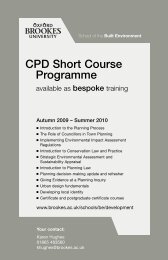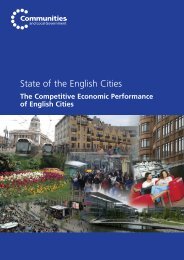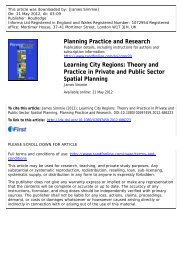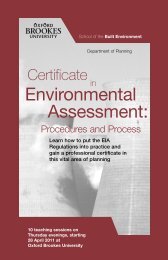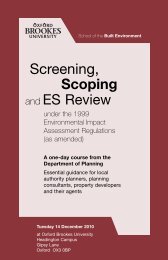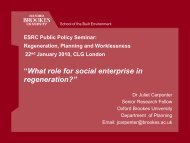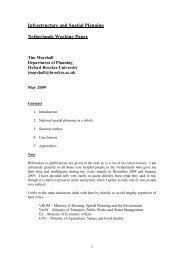History Matters: Path dependence and innovation in British city ...
History Matters: Path dependence and innovation in British city ...
History Matters: Path dependence and innovation in British city ...
Create successful ePaper yourself
Turn your PDF publications into a flip-book with our unique Google optimized e-Paper software.
undertake ground-break<strong>in</strong>g medical research,<br />
focus<strong>in</strong>g on build<strong>in</strong>g commercial-academic<br />
l<strong>in</strong>ks. However, these appear to be isolated<br />
examples of new path creation <strong>and</strong> firm<br />
formation, <strong>and</strong> as one respondent comments:<br />
“There are examples like that, but I th<strong>in</strong>k<br />
<strong>in</strong> terms of ‘significance’ they are probably<br />
fewer <strong>and</strong> far between than we would<br />
like, if we’re honest, <strong>and</strong> we could do with<br />
another dozen of those. And then I th<strong>in</strong>k<br />
we’d be start<strong>in</strong>g to motor a bit.” [Interview<br />
SW005]<br />
The limited new firm formation <strong>in</strong> Swansea<br />
is expla<strong>in</strong>ed by some respondents as a result<br />
of the historical dom<strong>in</strong>ance of traditional<br />
<strong>in</strong>dustries <strong>in</strong> Wales, where an entrepreneurial<br />
culture has not been present. The ‘job for<br />
life’ system which operated for generations<br />
<strong>in</strong> Wales, primarily through the coal <strong>and</strong><br />
steel <strong>in</strong>dustries, has meant that the spirit of<br />
entrepreneurship has not been fostered <strong>in</strong> local<br />
communities, thus lead<strong>in</strong>g to below average<br />
rates of new firm formation.<br />
“You come back to path dependency, we’ve<br />
locked <strong>in</strong>to the th<strong>in</strong>k<strong>in</strong>g “South Wales, we<br />
aren’t <strong>in</strong>novative. Innovation takes place<br />
elsewhere, it doesn’t take place <strong>in</strong> Wales”,<br />
so I th<strong>in</strong>k there’s that Welsh mentality of<br />
also downplay<strong>in</strong>g our achievements. The<br />
university’s quite good at that. We do very<br />
good th<strong>in</strong>gs, but we’re <strong>in</strong> Swansea, so we’re<br />
not <strong>in</strong> London, <strong>in</strong> Cambridge, we’re outly<strong>in</strong>g<br />
<strong>in</strong> the UK.” [Interview SW003]<br />
It is also felt <strong>in</strong> Swansea that new sp<strong>in</strong>out<br />
firms from the university are be<strong>in</strong>g hampered<br />
by the burden of academic expectations <strong>and</strong><br />
<strong>in</strong>stitutional bureaucracy.<br />
“I th<strong>in</strong>k the problem is, I don’t know if it’s<br />
just my perception, but universities are<br />
particularly bad at that, certa<strong>in</strong>ly on the<br />
sp<strong>in</strong>out side. I forget how many companies<br />
Swansea University sp<strong>in</strong>s out, but it isn’t<br />
a great deal, when you consider the<br />
<strong>in</strong>itiatives that they had with<strong>in</strong> that. And I<br />
th<strong>in</strong>k one of the th<strong>in</strong>gs they’re always told<br />
to do is create further l<strong>in</strong>ks with the SME<br />
community <strong>in</strong> the area, <strong>and</strong> it’s the one<br />
th<strong>in</strong>g that they never do because there’s no<br />
money <strong>in</strong> it.” [Interview SW005]<br />
Another respondent, a venture capitalist <strong>and</strong><br />
CEO of a high-tech start-up, comments on the<br />
difficulties he experienced when deal<strong>in</strong>g with<br />
universities:<br />
“There’s an awful lot of <strong><strong>in</strong>novation</strong> <strong>in</strong><br />
the university, but noth<strong>in</strong>g gets out. And<br />
there was no commercial bridge, there<br />
was noth<strong>in</strong>g fill<strong>in</strong>g that gap to the market<br />
place on <strong><strong>in</strong>novation</strong> […] <strong>and</strong> I found that<br />
is was very difficult to sp<strong>in</strong> companies out<br />
of universities. […] The process of sp<strong>in</strong>n<strong>in</strong>g<br />
out was pa<strong>in</strong>ful, <strong>and</strong> it was a turn off for<br />
<strong>in</strong>vestors, an absolute turn-off, <strong>and</strong> <strong>in</strong> the<br />
end, the stuff that we’ve done s<strong>in</strong>ce then<br />
has been our own stuff. If someone’s try<strong>in</strong>g<br />
to sp<strong>in</strong> out of a university right now, I’m<br />
th<strong>in</strong>k<strong>in</strong>g “Do I really want to get <strong>in</strong>volved?”<br />
Because this is go<strong>in</strong>g to be a nightmare.”<br />
[Interview SW002]<br />
There are at least two examples of sp<strong>in</strong>-<strong>in</strong>s<br />
to the university, where companies set up<br />
<strong>in</strong>dependently have approached the university,<br />
to see if they would like to collaborate.<br />
However, it is not clear how common this<br />
phenomenon is.<br />
3.5 Conclud<strong>in</strong>g remarks<br />
These two contrast<strong>in</strong>g case studies were<br />
chosen to illustrate <strong>in</strong> more detail the ideas<br />
expounded <strong>in</strong> Part 1 <strong>and</strong> the cross-<strong>city</strong> f<strong>in</strong>d<strong>in</strong>gs<br />
discussed <strong>in</strong> Part 2. Cambridge is one of the<br />
UK’s <strong>and</strong> Europe’s most <strong>in</strong>novative hightech<br />
economies, with its orig<strong>in</strong>s <strong>in</strong> the early<br />
1960s. Cambridge’s subsequent growth ga<strong>in</strong>ed<br />
critical momentum <strong>in</strong> the 1970s, establish<strong>in</strong>g<br />
a process of self-re<strong>in</strong>forc<strong>in</strong>g path dependency.<br />
The <strong>in</strong>itial cont<strong>in</strong>gent conditions – a lack of<br />
an old <strong>in</strong>dustrial past <strong>and</strong> attendant legacy<br />
together with the availability of ‘green-field’<br />
sites, a world-class university <strong>and</strong> the presence<br />
of forward-look<strong>in</strong>g enterpris<strong>in</strong>g <strong>in</strong>dividuals<br />
– all comb<strong>in</strong>ed to drive the emergence <strong>and</strong><br />
development of a new high-tech economy.<br />
Swansea experienced the opposite trajectory. A<br />
<strong>city</strong> encumbered with decl<strong>in</strong><strong>in</strong>g old <strong>in</strong>dustries,<br />
a less famous university <strong>and</strong> a general lack<br />
of an <strong>in</strong>dividualist entrepreneurial culture,<br />
has struggled to reconfigure its past <strong>in</strong>to<br />
an <strong>in</strong>novative high-tech future. Efforts are<br />
be<strong>in</strong>g made <strong>in</strong> this direction, but the ‘<strong>in</strong>itial<br />
conditions’ have been much less propitious<br />
than <strong>in</strong> Cambridge.<br />
What Cambridge also illustrates is the way that<br />
technological trajectories, once established,<br />
exhibit tendencies towards path <strong>dependence</strong>:<br />
that is, they also <strong>in</strong>herit the legacy of their<br />
own past. As each technological specialisation<br />
has emerged <strong>and</strong> become positively ‘locked<br />
<strong>in</strong>’, it has formed a pathway for cumulative<br />
59



